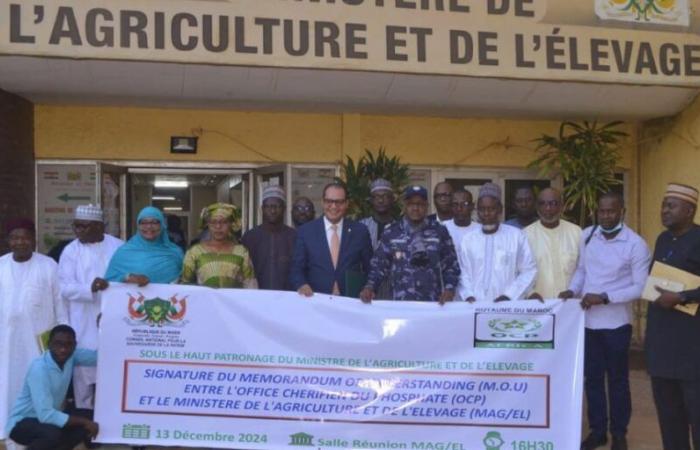OCP Africa, the World Bank and the government of Niger have signed a historic agreement to redefine the future of agriculture in the country. This innovative partnership is based on sustainable and inclusive solutions, combining modernization of agricultural practices, support for small farmers and the development of new economic opportunities.
In Niamey, a memorandum of understanding marking a major step forward was signed between OCP Africa, the Ministry of Agriculture and Livestock of Niger, and the World Bank. This collaboration ushers in a new era for Nigerien agriculture by focusing on innovation and sustainability.
Serving farmers
OCP Africa, a subsidiary of the OCP group and a key player in the agricultural transition in Africa, is committed to supporting Niger in its quest for modern and resilient agriculture. This partnership is based on concrete solutions to improve soil health, optimize yields and offer small farmers tools allowing them to sustainably escape poverty.
“It is a great honor for us to partner with the World Bank in this ambitious initiative aimed at promoting sustainable agricultural practices in the Republic of Niger, to ensure food security and contribute to the sustainable development of health and soil fertility,” said Dr. Mohamed Anouar Jamali, general director of OCP Africa.
Structuring initiatives for innovative agriculture
The agreement implements six priority areas, including soil mapping and the creation of suitable fertilization models. The new generation Agricultural Service Centers, true support hubs for farmers, will play a central role in providing quality inputs, mechanization equipment, irrigation systems and financing solutions.
At the same time, this effort will continue during the 2025 winter campaign, with the installation of 400 additional plots dedicated to rainfed crops, in addition to irrigated crops.
In total, nearly 630 demonstration plots will be developed: 400 for rainfed crops (millet, cowpea, rice) during the next winter season, and 230 for the 2025 irrigated season, including rice, onion, tomato. , potato, pepper and other crops. These plots, carried out in collaboration with local partners such as INRAN, serve as a showcase for innovative agricultural practices adapted to local realities.
People and research at the heart of the strategy
One of the strengths of this partnership is its human aspect, with particular attention paid to the entrepreneurship of young people and women in the field of agri-tech. Specialized training, supported by the expertise of the Mohammed VI Polytechnic University (UM6P), will strengthen the skills of agro-distributors and local farmers.
“Thanks to this collaboration, we will be able to modernize our practices and offer sustainable opportunities to rural communities,” underlined Ousmane Elhadj Mahaman, Nigerien Minister of Agriculture and Livestock.
A partnership model for Africa
This project, which is part of the dynamic of the agreements signed during the World Bank meetings in Marrakech in 2023, demonstrates OCP Africa’s commitment to creating high-impact public-private partnerships. By supporting local institutions and integrating innovative approaches, this initiative helps position Niger as an example in sustainable agriculture.
The agreement is not limited to meeting immediate needs. It also prepares the ground for a more resilient agricultural future, by capitalizing on modern tools, extensive technical support and a long-term vision.
“We are convinced that this initiative will sustainably transform Nigerien agriculture,” concluded Dr. Jamali.
By bringing together local expertise and international support, this collaboration between OCP Africa, the World Bank and Niger could well become an inspiring model for other African countries facing the same challenges.
Sanae Raqui / ECO Inspirations






